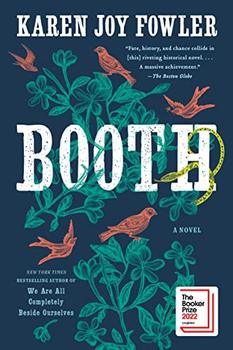Book Club Discussion Questions
In a book club? Subscribe to our Book Club Newsletter and get our best book club books of 2025!
For supplemental discussion material see our Beyond the Book article, The Booth Family and Shakespeare in the 19th Century United States and our BookBrowse Review of Booth.
Please be aware that this discussion guide will contain spoilers!
- Booth is a story about John Wilkes Booth, an infamous figure in American history. But Karen Joy Fowler doesn't center the narrative on John, instead choosing to tell the story of the Booth family, from the struggles of his parents to his many siblings. Why do you think Fowler chose to write this story in this way?
- Fowler's last book, We Are All Completely Beside Ourselves, was organized around a secret—a secret that the characters know but the reader does not. Booth is organized around something the reader knows but the characters do not. How did your awareness of Lincoln's assassination impact your reading?
- The Booths live in a two-story, two-room log cabin miles from any major city. How are the Booths perceived in their insular neighborhood deep in the woods? What effect do you think this secluded location has on the children's development—particularly that of Edwin, John, and Rosalie?
- According to Booth family lore, soon after John was born, "a flame rose from the ashes and, shaping itself into an arm, stretched toward the baby as if to knight him" (p. 60). In that flame, John's mother read the word Country, followed by John's name—a promise of a glorious fate. How aware do you think John, growing up, was of his own prophecy?
- On page 220, Fowler writes that Asia "dreams she's being swept away, one of a great many unlikely things bobbing in the current—books, cats, hats, chairs, a cow, and a banjo." Would you describe Asia as a dreamer? How so? How do you think this quality led her to live her life outside convention? To see her brother John through a certain lens?
- What was the role of women in the Booth family? Why was it respectable to be an actor but not to be an actress? Were you surprised, during the interlude on the farm after Junius's death, that three grown women would leave the survival of the family entirely in the hands of a fifteen-year-old boy?
- Do you think Rosalie's lion-tamer romance was real or just a fantasy that sustained her? Why did she believe that John had had a secret marriage and left a child behind when none of the other siblings believed this?
- Edwin and Joe each believe that they are the Booth sibling with the worst childhood. Which Booth would you argue had the most to feel aggrieved about? Did their mother take good care of them?
- Junius Booth, as the most famous stage actor of his time, held on to his vast spotlight, both onstage and at home. How did the Booth children try—and often fail—to come out from under his shadow? What made Edwin so determined to follow in his father's footsteps? Do you think John pursued theater for the same reasons?
- Slavery was the great issue of the day and yet, with the exception of John, the Booths seldom seem to have spoken of it. How is it possible to ignore something so ubiquitous and contentious and unjust, especially given their deep connection to the Hall family?
- Were you surprised by Lincoln's professions of white supremacy?
- Fowler weaves many Shakespearean elements throughout the story, often quoting from the plays. Talk about Junius's and Edwin's many attempts to conquer their famous roles. How did their adventures on the stage often foreshadow tragedies in their personal lives?
- As John becomes increasingly embroiled in the political scene, his family reminds him "that the time will come when he must choose—politics or the theater" (p. 236). Why do you think the Booths believed that politics and theater must remain separate? Is it possible that John's theatrical pursuits fueled his political goals? How so?
- Fowler illustrates many moments of deep comfort and intimacy between the siblings throughout this book. Are these just as important as the bigger, more dramatic moments and events? Why?
- At what point in the story did you start to discern a change in John? To what do you attribute this change? When do you think his family noticed this shift, or was it more gradual? What are some marked aspects of John's personality that his family failed to see?
- Despite knowing the assassination was coming, and despite not seeing the action on the page, how did you react when it happened in the story? Which sibling do you think was most affected by John's crime? Why? And why did Ann Hall remain so fond of John even after the assassination?
- Through this family story, Fowler explores what it feels like to be brutally betrayed by a loved one, but also to grieve their loss while the world can only spew hatred toward them. How does this make you think about love and pain, especially when it's so closely tied up with right and wrong?
- It is inevitable to read this period through the lens of our modern-day context. How do you think Booth sheds light on current events?
Unless otherwise stated, this discussion guide is reprinted with the permission of G.P. Putnam's Sons.
Any page references refer to a USA edition of the book, usually the trade paperback version, and may vary in other editions.
